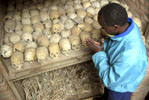
A week ago, and for just three brief hours, French President Nicolas Sarkozy paid a visit to Kigali, the first by a French leader since the 1994 genocide in Rwanda. The trip capped off steady improvements in relations between the two countries in recent months, which for years have been strained over France’s role in the genocide. As further evidence of France’s effort to “construct a relationship of confidence,” French authorities arrested a woman alleged to be a ringleader of the Hutu Power movement that orchestrated the premeditated attacks on Rwanda’s Tutsi population.
On the night of April 6, 1994, Madame Agathe, as she was known, reportedly had a straight view of the Rwandan president’s plane as it was shot out of the sky and landed on the grounds of the Presidential palace. The assassination set off a countrywide killing spree that would leave 800,000 people dead in 100 days. It was part of a plan that Madame Agathe allegedly helped hatch from her place of prestige: as the president’s wife.
On Tuesday, French authorities arrested Madame Agathe in a Paris suburb, where she has lived since French authorities airlifted her out of Rwanda in the early days of the genocide. Her name has been near the top of Rwanda’s long list of genocidaires living in countries where they are protected from prosecution by legal loopholes or lack of political will. France’s refusal to extradite wanted genocidaires and disinterest in pursuing them on French turf has been a major point of contention between the two countries, but now it seems France is taking the lead in devising clear ways of prosecuting the likes of Madame Agathe.
During a visit to Rwanda by French Foreign Minister Bernard Kouchner that paved the way for Sarkozy’s trip, France announced the formation of a unit within Paris’ Tribunal de Grande Instance that will help expedite war crimes and genocide cases committed in France or abroad. The unit will include language specialists and historians, and while it isn’t yet operational, French authorities seem eager to start filling their docket: A week before Sarkozy’s Kigali visit, police arrested a Rwandan doctor in a small southern French town who had been dubbed the Butcher of Tumba and accused of killing Tutsis near the Rwandan university town of Butare. A French court will decide in early June whether to extradite Dr. Sostene Munyemana.
Post-genocide, relations between Rwanda and France hit an all-time low in 2007 when the government of rebel leader-turned-president Paul Kagame cut diplomatic ties with France in reaction to a French report accusing nine Kagame associates of shooting down President Habyarimana’s plane in 1994. The very dramatic diplomatic split – which sent even French affiliated with non-governmental organizations in Rwanda packing – was accompanied by a call for a Rwandan commission to investigate the downing of Habyarimana’s plane. The Mutsinzi commission, named for its lead author, revealed its findings in January, which pin responsibility for the Habyarimana assassination on members of Hutu Power, including his own wife.
In spite of the obvious self-interest of Kagame’s government in the commission’s report, the investigation that produced it was serious and thorough, according to Rwanda expert Philip Gourevitch, writing for the New Yorker blog:
[The Mutsinzi commission] traces the history of earlier investigations into Habyarimana’s assassination and the genocide, and draws on these findings (which have never before been collected and cross-referenced) to build its own. The Mutsinzi commission brought in independent British ballistics experts to establish the trajectory and origins of the missiles that struck the plane; and, in passages of the report that read like pure farce, they traced the mystery of the black box from the cockpit, which kept disappearing and reappearing and ultimately vanished.
As Gourevitch pointed out, the timing of the Mutsinzi report and the reestablishment in November of diplomatic relations between Rwanda and France is significant. Undoubtedly, the French got a sneak peek at the Mutsinzi findings, and “the normalization of relations amounts to France’s acceptance of the report’s conclusions,” Gourevitch wrote.
Since then, France-Rwanda relations have been on the up-and-up, leading to this week’s stunning move against Agathe Habyarimana. This case, a quick and tangible follow-up to Sarkozy’s visit, seems to signal that France’s commitment to mending ties with Rwanda goes beyond carefully crafted statements (which, it must be noted, still stirred controversy because while the French president acknowledged “a sort of blindness” to the genocidal dimension of Habyarimana’s regime, he stopped short of issuing a formal apology). For his part, President Kagame, often a vocal critic of countries that refuse (for some justifiable reasons) to turn over apprehended genocidaires to Rwandan authorities, addressed the issue of extradition at a press conference this week. While Kagame shoulders much of the blame for the judicial system’s serious deficiencies, his point was valid: “If they don’t trust our justice system, let them use theirs to try these cases. All we are asking for is justice.”
Finally, 16 years on from the horrors of 1994, Kagame’s sentiment is beginning to sound a little less like wishful thinking.
Photo: A genocide survivor prays at a memorial in Rwanda (AP/Sayyid Azim)

